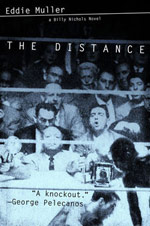- Welcome
- Noir Zine
- Allan Guthrie
- Books
"...those who enjoy the darker side of the genre are in for some serious thrills with this..."
Laura Wilson, The Guardian

Published in the UK by Polygon (March 19th, '09) and in the US by Houghton Mifflin Harcourt (Nov '09).
Eddie Muller's The Distance
Reviewed by Ray Banks
Billy Nichols should be on top of his game. He's a well-respected man about town, San Francisco's Mr Boxing, one of the old school sports reporters. He looks like William Powell, he's in with the in crowd. Got himself a nice house, a wife and enough fans in the circuit to make him a wanted personality. And then Hack Escalante, a simple but strong boxer, hits his manager Gig Liardi. That one punch proves too hard. And with Gig pushing up the daisies near the Golden Gate, Mr Boxing's about to find himself in a world of trouble.
 The Distance marks Eddie Muller's fiction debut. Previously documenting American sin in Grindhouse: The Forbidden World Of "Adult Only" Cinema, and the black and white dramas of film noir (Dark City, Dark City Dames and The Art Of Noir), Muller throws himself full weight into the crime fiction waters. If the idea of a book set in the forties, primarily against a backdrop of the San Francisco boxing circuit doesn't appeal, think again. While Muller certainly has chops when it comes to film noir, this is no half-hearted pastiche of forties' cinema. If anything, Muller owes a substantial debt to Leonard Gardner's Fat City (which Muller acknowledges in his Author Commentary), a novel rich in characterisation and verisimilitude.
The Distance marks Eddie Muller's fiction debut. Previously documenting American sin in Grindhouse: The Forbidden World Of "Adult Only" Cinema, and the black and white dramas of film noir (Dark City, Dark City Dames and The Art Of Noir), Muller throws himself full weight into the crime fiction waters. If the idea of a book set in the forties, primarily against a backdrop of the San Francisco boxing circuit doesn't appeal, think again. While Muller certainly has chops when it comes to film noir, this is no half-hearted pastiche of forties' cinema. If anything, Muller owes a substantial debt to Leonard Gardner's Fat City (which Muller acknowledges in his Author Commentary), a novel rich in characterisation and verisimilitude.
So it is with The Distance. Whilst a majority of nostalgic noir fiction relies heavily on a reader's memory of Bogart and Cagney, throwing wise-cracking PIs and lipstick-heavy molls together in a collage of retro-hardboiled-cool, Muller eschews the rain-soaked mean streets for a more mature and - dare I say it - literary experience. Whether it's the combination of grit and simplicity inherent in the heavyweight Hack Escalante, the cracked sadness of his wife Claire or the shaky ego of Billy Nichols, Muller infuses his characters with enough emotion and unpredictability to make them indistinguishable against the real people who pass through the book. Nichols' wife could quite easily have been a screeching harpy, Claire Escalante the femme fatale and Hack the dumb-as-an-ox palooka. But in Muller's hands, they're human beings, capable of a lot more than mouthing wise-ass one-liners. These characters are trapped by their own desires, make mistakes that are utterly believable given the circumstances. There are no heroes, no villains, just hurt people trying to ease the pain.
This is a substantial world that Muller has created, one that screams with realism. The forties San Francisco backdrop isn't there as window dressing; it's a vibrant core to the story not only of Billy Nichols' increasingly challenged morality but also of the evolution of boxing. And while that may sound a little dry to a reader wanting more viscera in their reading material, the fight scenes in The Distance are among the best I've read. Muller knows his stuff and it shows, especially in Hack Escalante's final fight against heavyweight champion Chester Carter as Muller mixes Nichols' staccato reportage (underscored by a desperate need for Hack to win) with the almost musical description of the fight itself. The scene is representative of the book as a whole, written with a strength and grace that set The Distance apart, not only from the heaving raft of nostalgic noir, but also from that majority of crime novels where good and bad are painted in broad strokes. Those readers wanting black and white will probably be disappointed. But anyone with the slightest interest in those tricky things like plot, characterisation and emotional verisimilitude should get their hands on a copy pronto. Because The Distance might well look like a down-and-dirty crime novel, but it's a down-and-dirty crime novel with intelligence and heart.
Also, credit is due to Uglytown for the sterling job they've done with the novel. If a book is a movie in your pocket, this one's a special edition DVD. In addition to the introduction by Leonard Gardner, there's an Author Commentary (wherein Muller tells us how the book came to be written) and a selection of deleted scenes. And while this normally wouldn't be such a big whoop, the quality of the material here is uniformly excellent. It's always nice to see smaller publishers shaming the Big Lads.
Now I'm just waiting for them to reprint Shadow Boxer.
###
Copyright © 2006 Ray Banks
RAY BANKS' first novel The Big Blind was published by PointBlank in 2004. The first novel in the Cal Innes series Saturday’s Child will be published by Polygon in May 2006. He also joins an all-star line-up in Akashic Books' Dublin Noir edited by Ken Bruen. But he really doesn’t like to talk about himself. Especially in the third person.
